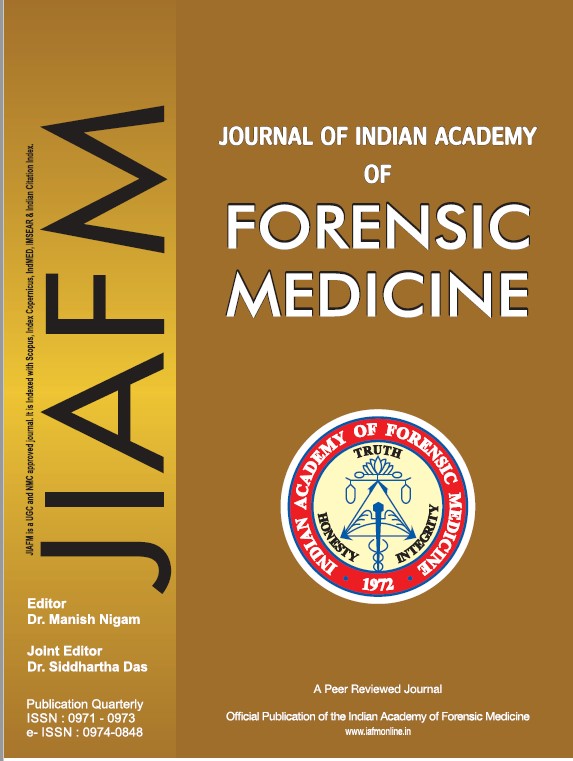Incidence of Different Type of Lip Lines among Medical Students at Prayagraj
DOI:
https://doi.org/10.48165/jiafm.2024.46.2.1Keywords:
Lip lines, Identification, CheiloscopyAbstract
Despite other available methods of identification studies of lip lines is emerging as a reliable tool of personal identification. The lip surface contains numerous fine grooves distributed vertically and horizontally at different inclinations to give rise to different types of lip lines. Study of lip print is called Cheiloscopy. Present study has been done to observe incidence of types of lip lines in different quadrants of lips on 200 undergraduate medical students at Moti Lal Nehru Medical College, Prayagraj. Digital images of lip lines were taken with the help of a DSLR Camera and observed using Tsuchihashi classification system. Type 1 (complete vertical) was the most common variety of lip line observed followed by Type 1'> 4 >2>5 > 3 in males and Type 1' > 4 > 5 > 2 > 3 among female subjects in order of incidence. Type 1 and lines in a clockwise manner from upper right (UR), upper left (UL), lower left (LL) to lower right (LR) quadrant of lips. This Type 1' lip lines were found commonly on lower lip quadrants (LL > LR) while Type 4 and Type 5 lines on upper lip quadrants (UL > UR) in most of male and female subjects. Order of incidence of different lip lines in upper quadrants (UR and UL) was Type 4> 5>2>3> 1'> 1among male and Type 4 >5>2>1' > 3>1 among female subjects while on lower lip it was Type 1> 1'>2>3 >4>5 in male and Type 1>1' >2>5 >3>4 in female subjects.
Downloads
References
Kasprzak J. Possibilities of cheiloscopy. Forensic Sci. Int.
;46:145–151.
Williams TR. Lip Prints – Another means of identification. J
Forensic Indent. 1991;41:190–4.
Suzuki K, Tsuchihashi Y. a new attempt of personal
identification by means of lip print. Can Soc Forensic Sci J
;4:154–158.
Tsuchihashi Y. Studies on Personal Identification by means
of Lip Prints. Forensic Science (1974), 3:233-248.
Prabhu RV, Dinkar, A, Prabhu V (2013). Digital
method for lip print analysis: A New approach. Journal of
Forensic Dental Sciences. 5(2), 96-105. https://doi.org/
4103/0975-1475.119772
Chadha A, Vineetha R, Kumar M, Bansal D, Pai KM,
& Aithal PK (2022). Lip print evaluation of Indian and
Malaysian-Chinese subjects by manual and digital methods:A correlational study with gender and ethnicity. Egyptian
Journal of Forensic Sciences, 12(1), 1-10. https://doi.org/
1186/s41935-022-00273-7
Gondivkar SM. Cheiloscopy for Sex Determination.
Journal of Forensic Dental Sciences 2009; 1(10.4103/0974-
60374)
Prabhu RV, Dinkar A & Prabhu V (2013). Digital
method for lip print analysis: A New approach. Journal of
Forensic Dental Sciences. 5(2); 96-105.
Navit S, Pramanik S, Khan SA, Jabeen S, Grover N, &
Bharti A (2021). Cheiloscopy and Dactyloscopy as Behavior
Assessment Tool in Dental Settings: A Cross-sectional Study.
International Journal of Clinical Pediatric Dentistry. 14(2);
-242.
Saraswathi TR, Kavitha B, Einstein A & Sivapathasundha-
ram B, Limitations in forensic odontology. J Forensic Dent
Sci. 2009;1(1): 8-10.
Venkatesh R & David MP (2011). Cheiloscopy: An aid for
personal identification. Journal of Forensic Dental Sciences,
(2); 67-70. https://doi.org/10.4103/0975-1475.92147
Koneru A, Surekha R, Nellithady GS, Vanishree M,
Ramesh D & Patil RS. Comparison of lip prints in two
different populations of India: Reflections based on a
preliminary examination. J Forensic Dent Sci.2013;5:11–15.
El Domiaty MA, Al-gaidi SA, Elayat AA, Safwat MD, Galal
SA. Morphological patterns of lip prints in Saudi Arabia at
Almadinah Almonawarah province. Forensic Sci Int.
;200:179.e1-9.
Adamu L, Taura M, Hamman W, Ojo S, Dahiru A,
Sadeeq A & Umar K (2015). Study of lip print types among
Nigerians. HOMO, 66(6), 561-569. https://doi.org/
1016/j.jchb.2015.08.002
Vahanwahal SP & Parekh DK. Study of lip prints as an aid
to forensic methodology. J Indian Dent Assoc. 2000;71:269-
Kapoor N & Badiye A. A study of distribution, sex
differences and stability of lip print patterns in an Indian
population. Saudi J Biol Sci. 2015.
Pratibha P, Srii R, Swagat, Kumar M, (2019) Digital
Photographs in Analysis of Lip Prints for Gender
Identification.
Neo XX, Osman K, Hamzah A, SPA & Noor Hazfalinda H.
Lip prints in sex and race determination. Jurnal Sains
Kesihatan Malaysia. 10(1): 29-33.
Ghimire N, Ghimire N, Nepal P, Upadhyay S, Budhathoki S,
Subba A & Kharel B (2014). Lip print pattern: an
identification tool. Health Renaissance. 11(3), 229–233.
Nishi R. and Sreedevi Olappamanna Lip Print Patterns of
Palakkad. Kerala 2018.


